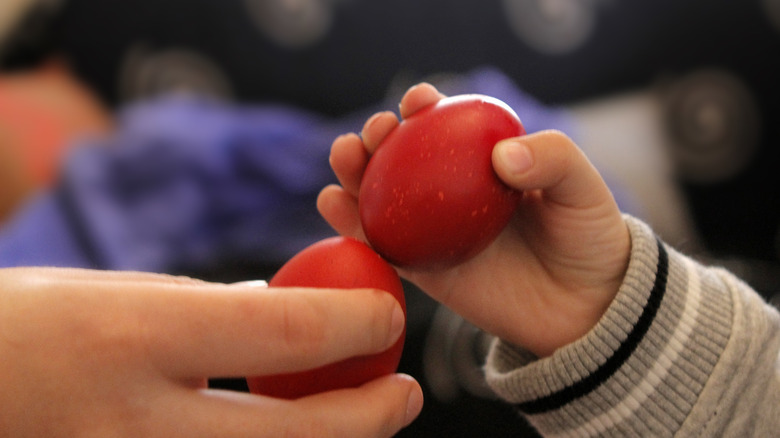The Symbolic Reason Eggs Are Dyed Red For Greek Easter
For those of you who grew up celebrating Easter on a different day from your classmates and friends, are used to cooking up lamb instead of turkey or ham during holidays, and dread the long Orthodox holiday church services, this article is for you! That is to say, if you grew up in or around the Greek Orthodox Church, you'll know that Easter is just as big and festive a holiday as Christmas. Greek Orthodox Easter, Pascha, is a time of feasting, family, and traditions dating back two thousand years (via Greek Reporter). Greek Easter does not always land on the day most of the Western world celebrates the holiday. The Concord Monitor says that this is because Orthodox churches use the Julian calendar, while Western churches use the Gregorian calendar. But when Greek Easter does roll around, it arrives with a heap of wonderful and often delicious traditions.
According to Bluevillas, there are six major Greek Easter traditions that most people adhere to. Church bells are rung and flags fly at half mast, a midnight church service is held, tsoureki (a classic Greek Easter bread) is baked, magiritsa is served (Greek soup made from lamb offal), lamb is roasted on the spit, and last but not least is the egg-cracking ceremony.
It is called Tsougrisma
The Greek Easter egg cracking tradition, Tsougrisma (τσούγκρισμα) aka "the clashing" (via Greek Cargo), has been around as long as anyone can remember. It comes with a particular set of instructions: first, the eggs are to be dyed blood-red (so there are no brightly colored eggs in Greek households). Greek Cargo says that the reason the eggs are red is because they are meant to represent the blood of Jesus. There is a whole lot of symbolism wrapped in such a small breakfast food: the shell of the egg represents the sealed tomb of Christ, and when the eggs are cracked together, with the intention of breaking one or the other, it represents Jesus breaking out of the tomb after his resurrection.
If you need a reminder of how to play Tsougrisma, or are trying to learn how to impress your Greek friends during the holidays, Select Bakery describes how to play. On Greek Easter Sunday, each person chooses a red egg. Look at the person sitting next to you, say "Christos Anesti" (which translates to "Christ has risen"), and the other person will respond "Alithos Anesti" (translates to "Indeed, he has risen"). You then tap the ends of your eggs together (it must be the same end), and whoever's egg cracks loses the round. You go around the group until only one person has an unbroken egg-end and they are declared the winner, earning all the good luck for the rest of the year.

